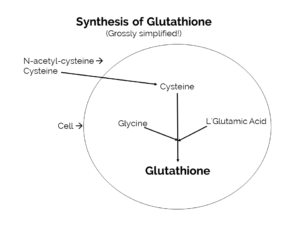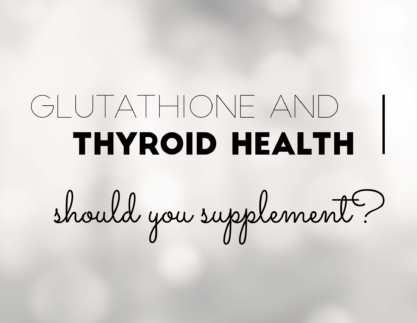As you will come to learn today, the glutathione system is of critical importance to all metabolically active systems in the body, AKA to everything! And we need to make more of it! Now I don’t want you to think that I am being inflammatory here, the truth is, when this system is not working properly the result is oxidative stress, inflammation and a decrease in the proper function of organs such as your thyroid, liver, kidneys, ovaries etc.
One thing that I also want to clear up before we get started is the difference between glutathione, and glutathione peroxidase. Glutathione peroxidase is the enzyme system that allows glutathione, the peptide, to do its job and sweep up inflammation. You need both of these things, but it can get confusing so I wanted to get that out of the way before we dive in.
What is glutathione?
Glutathione (pronounced gloota-thigh-own) is the master antioxidant in the body, otherwise known as the neutralizer. Glutathione is composed of one molecule of L’glutamic acid, L’Cysteine and Glycine. The sulfur component of this peptide is like a magnet for reactive oxygen species, that wreck havoc on our bodies. Glutathione is critical to many functions in the body, most relevant here being in proper immune function, decreasing inflammation and proper liver detoxification.
Why is glutathione important in thyroid health?
Well for two reasons, the thyroid is one of the most metabolically active tissues in the body – just bopping along all day long to make your thyroid hormone. During this process of thyroid hormone creation, where thyroglobulin combines an iodine molecule with tyrosine, a lot of reactive oxygen species (ROS) (oxidative stress) are created1. This needs to be cleaned up or is acts like a rabid dog, attacking the surrounding tissues. And glutathione is what comes in to calm the situation.
Glutathione peroxidase is also critical in this reaction because it allows glutathione to do its job, neutralizing the ROS and turning it into water. Without proper removal of these reactive oxygen species our body gets inflamed, the risk for cancer and autoimmunity rises, and the function of the thyroid decreases.
How to make glutathione in the body- the role of NAC.
 Glutathione is made in the body when there is an abdunace of the rate limiting sulfur amino acid cysteine2. And what is rate limiting you may ask? That essentially means that without cysteine no glutathione can be made. It would be like trying to build a house with no foundation. This is where one of my favroite supplements comes into play, N-acetyl-cysteine, or NAC. NAC is a sulfur amino acid donor, stocking the body full of cysteine in order to allow the glutathione synthesis to occur.
Glutathione is made in the body when there is an abdunace of the rate limiting sulfur amino acid cysteine2. And what is rate limiting you may ask? That essentially means that without cysteine no glutathione can be made. It would be like trying to build a house with no foundation. This is where one of my favroite supplements comes into play, N-acetyl-cysteine, or NAC. NAC is a sulfur amino acid donor, stocking the body full of cysteine in order to allow the glutathione synthesis to occur.
In the literature 600mg of NAC has been shown to be able improve immune function and decrease oxidative stress in healthy human subjects3. Additionally, supplementing NAC in situations of increased oxidative stress, ie exercise, also improved exercise tolerance, reduced oxidative stress and improved gluthatione balance4.
After adequate levels of cysteine are present, a number of enzymatic reactions occur to combine glycine, cysteine and L’glutamic acid to make glutathione.
“…many people can see their anti-bodies decrease, their conversion increase and their fatigue, hair loss, weight regulation issues begin to decrease. “
Should I supplement with glutathione?
The jury is still out on this one. We know that supplementing with oral glutathione, that is unstabilized, results in near complete breakdown in your gastrointestinal tract before the glutathione can get into your body. New forms of glutathione have come out, including liposomal, and many are claiming that it has a better absorption rate. Alternatively, intravenous glutathione is also available in many places and has the benefit of skipping the breakdown and absorption processes in the gastrointestinal tract.
As a general rule, I suggest supplementing with the precursors to glutathione before supplementing with the peptide itself. There are certain cases of chronic disease, and fertility issues, where there is exception. If you are a generally well thyroid patient, then NAC and selenium may be an appropriate place to start.
How do we increase glutathione peroxidase in the body?
Glutathione peroxidase, the enzyme that speeds up the glutathione system, is a selenoprotein, meaning that requires selenium to function properly. Selenium is a mineral that is becoming more and more deficient from the Earths soils, meaning that is it more difficult to get consistent levels in our diet. This does not mean that North Americans are all grossly deficient, but what it does suggest is that suboptimal levels may be present (and that is if you are eating a diet rich is unprocessed foods!).
Due to the fact that selenium is highly involved, and critical to the formation of glutathione peroxidase, deficiency in selenium has actually been shown to predispose people to autoimmune thyroid conditions. One case study showed that supplementation with 50-100mcg of selenium increased glutathione peroxidase by 21% and decreased anti-TPO by 76% in 14 months. Furthermore, stopping supplementation was followed by a 3 fold drop in glutathione peroxidase and a rise in anti-TPO5. Yet another of the many studies confirmed these findings, showing lower anti-TPO levels, and improve thyroid tissue appearance on ultrasound6,7.
As an aside, selenium is also critical to the conversion from T4 to T3. You will remember from the Thyroid 101 series that iodothyronine deiodinases are required in this conversion, and these deiodinases are all selenium dependent! Therefore, if you are on synthroid and not converting your T4 to T3 properly then selenium may be a helpful supportive supplement.
Wrap Up
As you can see the glutathione system is intricate, and complex, but it has a huge impact on our overall health! We need both the proper amount and function of glutathione and glutathione peroxidase for the system to work properly.
On the daily we are subjecting our bodies to poor dietary choices, toxins, pollution and many other challenges. Add this to a genetic predisposition, nutrient deficiencies and chronic stress and well, you have a recipe for immune dysregulation. The positive thing in all of this is that there is enough research to suggest that you can support your thyroid and immune system through increasing the amount of glutathione that are around to sweep up the mess we make! Whether you begin with NAC and selenium or liposomal glutathione, many people can see their anti-bodies decrease, their conversion increase and their fatigue, hair loss, weight regulation issues begin to decrease.
Also, do not forget to read the Thyroid 101 series!

Dr. Sarah Wilson is a naturopathic doctor and functional medicine provider in Toronto, Ontario. She treats patients locally in her hormone health focused practice. In Ontario NDs have the ability to prescribe natural desiccated thyroid hormone and Dr. Sarah frequently uses this to optimize the health of her patients.
If you want to improve your thyroid health using diet, supplements and hormone optimization then book an appointment here!
(**Please note: due to naturopathic regulations in Ontario Dr.Sarah can only treat patients in Ontario)
If you want my quick guide to interpreting your thyroid labs, ideal reference ranges and understanding your condition then sign up below!
DownloadYour Freebie
Sign up now to get your guide to optimal thyroid health!
References
- Miot, F., Dupuy, C., Dumont, J. & Rousset, B. Chapter 2 Thyroid Hormone Synthesis And Secretion. (2015). at <https://www.ncbi.nlm.nih.gov/books/NBK285550/>
- Lu, S. C. Glutathione synthesis. Biochim. Biophys. Acta 1830, 3143–53 (2013).
- Urban, T., Akerlund, B., Jarstrand, C. & Lindeke, B. Neutrophil function and glutathione-peroxidase (GSH-px) activity in healthy individuals after treatment with N-acetyl-L-cysteine. Biomed. Pharmacother. 51, 388–90 (1997).
- Kerksick, C. & Willoughby, D. The antioxidant role of glutathione and N-acetyl-cysteine supplements and exercise-induced oxidative stress. J. Int. Soc. Sports Nutr. 2, 38–44 (2005).
- Zagrodzki, P. & Ratajczak, R. Selenium supplementation in autoimmune thyroiditis female patient–effects on thyroid and ovarian functions (case study). Biol. Trace Elem. Res. 126, 76–82 (2008).
- Nacamulli, D. et al. Influence of physiological dietary selenium supplementation on the natural course of autoimmune thyroiditis. Clin. Endocrinol. (Oxf). 73, 535–9 (2010).
- de Farias, C. R. et al. A randomized-controlled, double-blind study of the impact of selenium supplementation on thyroid autoimmunity and inflammation with focus on the GPx1 genotypes. J. Endocrinol. Invest. 38, 1065–74 (2015).

